Back in December there was a flurry of press around the passage of a banking bill that was 1) reportedly written by Citigroup and 2) put taxpayers on the hook for over-the-counter derivatives, obscure financial instruments that periodically blow up and in which Citi had a big position. Distrustful cynics like Massachusetts Senator Elizabeth Warren claimed to see a connection:
Video: Senator Warren on Citigroup and its bailout provision
But most other people, especially those who remember how enthusiastically Citi blundered into the previous decade's housing bubble just in time to be nearly-bankrupted by it, tended towards a more charitable explanation: Citi wasn't smart enough to manipulate the legislative process, so whatever they were up to it was probably accidental.
But then Zero Hedge published this, which calls our preconceptions about Citi's stupidity into question:
Is Citi the next AIG?
This fascinating piece of investigative journalism is too long and complex to excerpt here. You have to read the whole thing because every paragraph and every chart is a new bit of damning evidence. But for those who refuse to read it (though seriously, you should) I'll summarize the high points:
In the third quarter, the part of Citi that is insured by taxpayers went on a derivatives writing binge, taking its total exposure to $70 trillion (with a "t"). Then it wrote a draft of new legislation that would delete part of an old law forbidding the government from bailing out banks' derivatives positions. Then it lobbied successfully to get its language written into the latest banking bill. Then it revealed its new derivatives portfolio to the world.
In asking if Citi is the next AIG, Zero Hedge is referring to the previously-obscure insurance company that had somehow become one of the world's biggest derivatives players just in time for that market to blow up in 2008. Had it not been bailed out with several trillion dollars of taxpayer cash it would have taken down Goldman, Citi, JP Morgan Chase and pretty much the entire rest of the global financial system. Zero Hedge then goes on to speculate that Citi might be covering up some kind of company-threatening position that will, in the near future, require the aforementioned taxpayer bailout.
If all this is true, then Citi deserves serious props for adaptability. They screw up, and instead of immediately melting down they hatch an imaginative plan to hijack what's left of the federal government, implement it over the public objections of high-profile senators, and then kind of brag about it by announcing their new status as America's biggest derivatives player.
Have to admit it, this is the behavior of a highly intelligent entity. Evil, yes, but smart.















